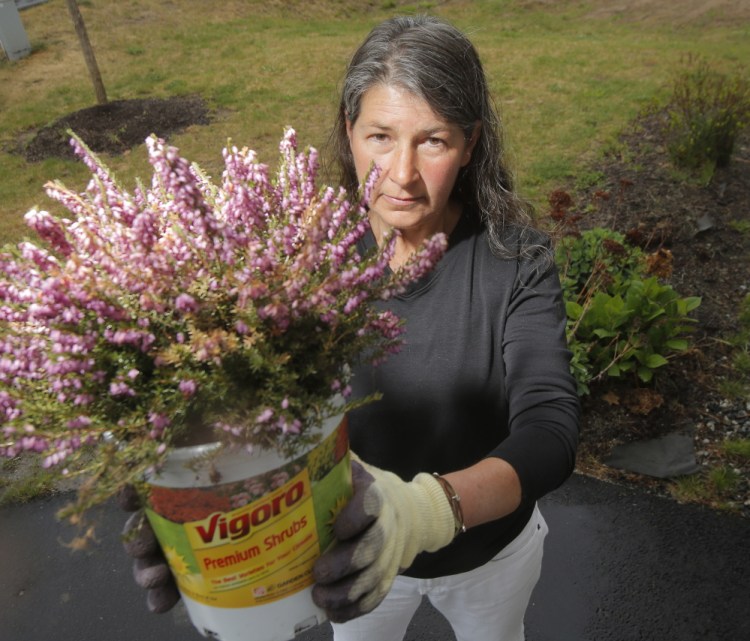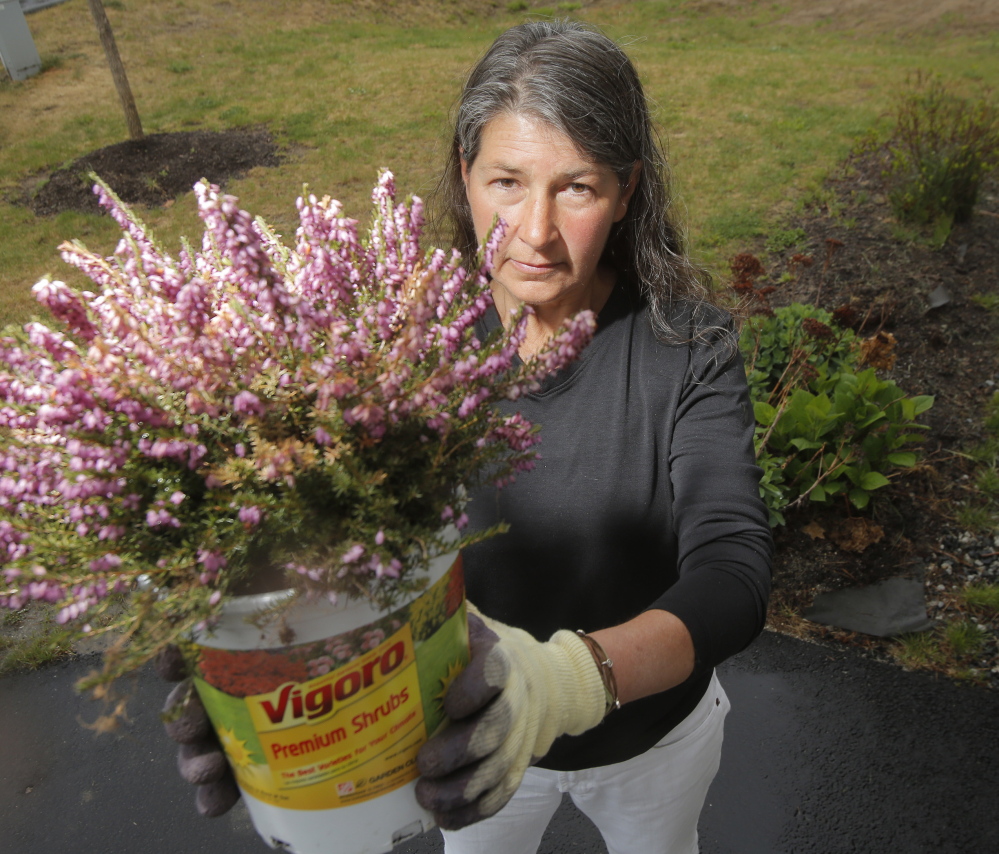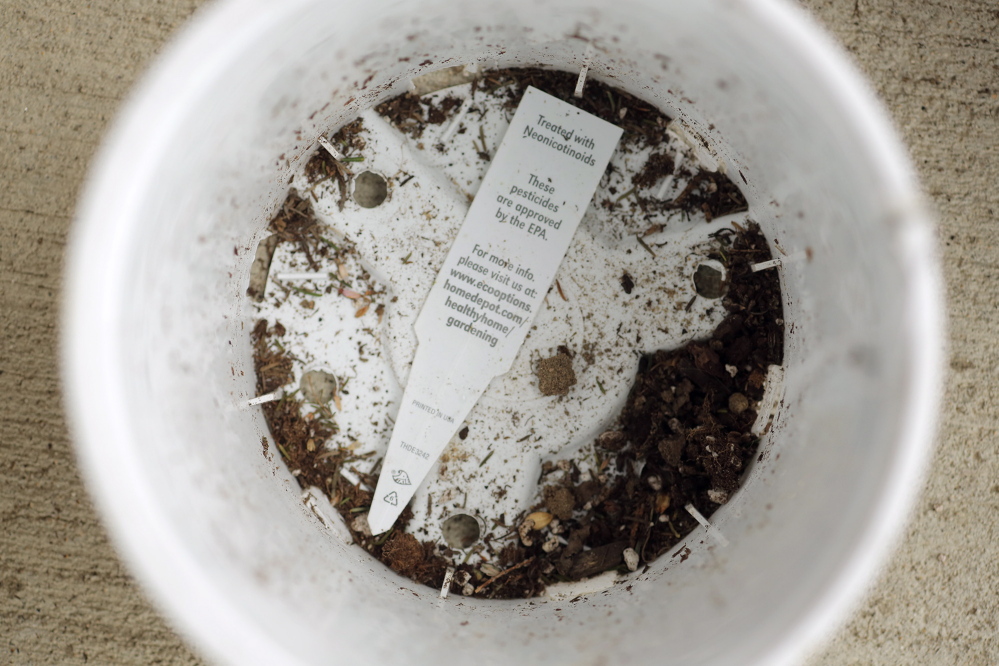More Maine retailers have begun phasing out use of a class of pesticides that research shows harm honeybees, but consumers may still be confused about what stores have done to get rid of them.
Neonicotinoids have come under closer scrutiny because of their effect on bees, which are vital to plant pollination, but the U.S. Environmental Protection Agency still hasn’t taken a firm stance on banning production. Retailers, in part because of public pressure, are trying to address the problem pesticides themselves, but there is no uniform policy. Some stores have pulled products with neonicotinoids from shelves, some have begun labeling them and some have done nothing, creating confusion among consumers about which plants to purchase.
Pam Jones, who lives in Kennebunk, found that out the hard way.
She uses organic soil in her garden and tries to avoid pesticides. When she bought a heather plant recently from the Home Depot in Biddeford, she assumed it was free of neonicotinoid pesticide because there was no label on the plant indicating its presence.
It wasn’t until Jones got home and took the plant out of its temporary pot that she saw the label – stuck to the bottom of the plant.
“If that’s where they are putting these labels, what’s the point?” she said. “When I went back to the store, the clerk said several other customers had asked about labeling as well.”
Matt Harrigan, spokesman for Atlanta-based Home Depot, which has more than 2,200 stores worldwide, said the company – with guidance from the EPA – is still monitoring research on the effects of neonicotinoids on honeybees.
“In the meantime, we’re one of the few retailers that has started requiring our suppliers to label neonic-treated plants so customers who believe neonics are impacting the bee population won’t purchase those plants unknowingly,” Harrigan said in a prepared statement. “The fact is, most nurseries sell at least some plants treated with neonics.”
Harrigan said all plants sold at Home Depot are supposed to be clearly labeled, but he couldn’t speak for every store.
Lowe’s, the second-largest home improvement chain, announced last year that it was phasing out the sale of all products that contain neonicotinoid pesticides within 48 months. However, products that still contain neonicotinoids may not all be labeled.
“We are currently working with growers and suppliers of live plants to eliminate the use of neonic pesticides on bee-attractive plants we sell and encouraging them to use biological pest control methods,” said Steve Salazar, manager of corporate communications for Lowe’s, based in North Carolina. “We plan to have plants and nursery products tagged with information highlighting bee health and encouraging customers to be mindful of pollinator health when using pesticides. The timeframe for adding the tags is being determined.”
Two southern Maine retailers, Eldredge Lumber and Hardware in York and Kittery Ace Hardware, have already removed several lawn and garden products that contain neonicotinoids. The stores also have stopped carrying the widely used weed killer Roundup and is considering discontinuing other products that may have adverse environmental impacts.
“It is easy to order the stuff into the store, but almost impossible to return it to the manufacturers,” said owner Scott Eldredge. “Sure, I might lose some sales, but I don’t care. There are potentially less harmful alternatives, and my staff is ready to help the public make better, safer choices.”
Eldredge said he hopes to eventually make his stores completely chemical-free.
Katherine Paul, associate director of the Organic Consumers Association and a Freeport resident, said many more retailers nationwide have taken steps to eliminate the pesticides, although they have different timelines and guidelines for labeling.
Some other retail chains have yet to update their policies on neonicotinoids, she said, but are facing growing pressure.
The movement away from neonicotinoids is in part a response to a study published by Environmental Science and Pollution Research which found that pesticides were a key contributing factor in the population decline of honeybees.
The EPA last month issued a moratorium that restricts the use of new pesticides, but the policy does not apply to products currently on the market.
“Unfortunately, the EPA, in deference to large pesticide-makers, is slow to move on regulating toxins like neonicotinoids,” Paul said. “The shift away from toxic pesticides shows the power of consumer pressure on corporations to do the right thing.”
Copy the Story Link
Send questions/comments to the editors.






Success. Please wait for the page to reload. If the page does not reload within 5 seconds, please refresh the page.
Enter your email and password to access comments.
Hi, to comment on stories you must . This profile is in addition to your subscription and website login.
Already have a commenting profile? .
Invalid username/password.
Please check your email to confirm and complete your registration.
Only subscribers are eligible to post comments. Please subscribe or login first for digital access. Here’s why.
Use the form below to reset your password. When you've submitted your account email, we will send an email with a reset code.